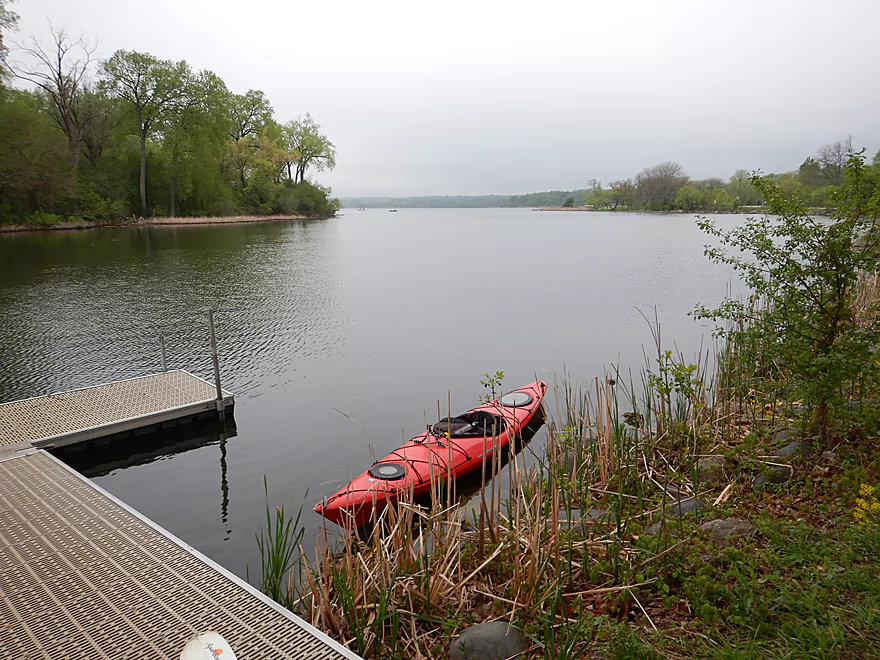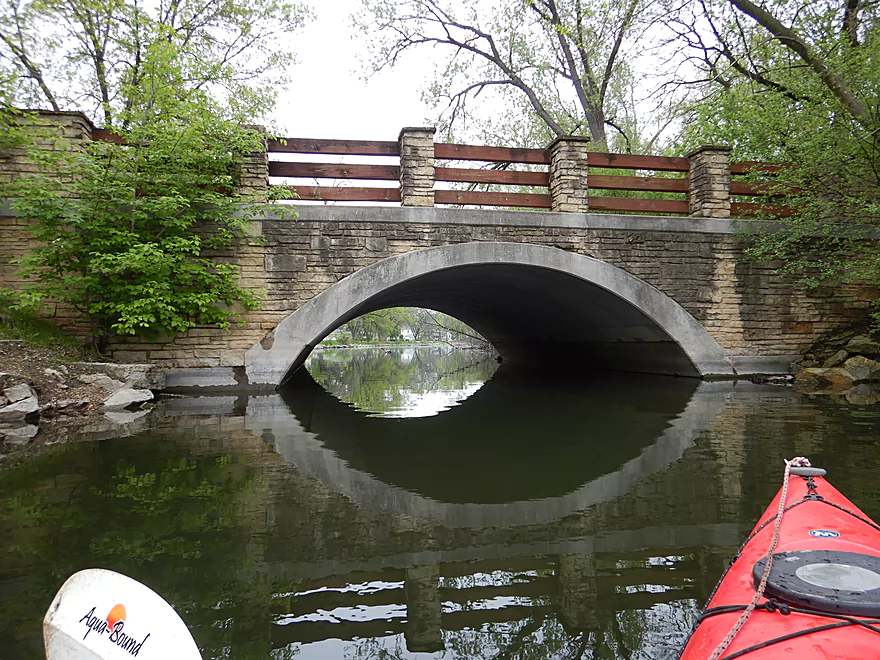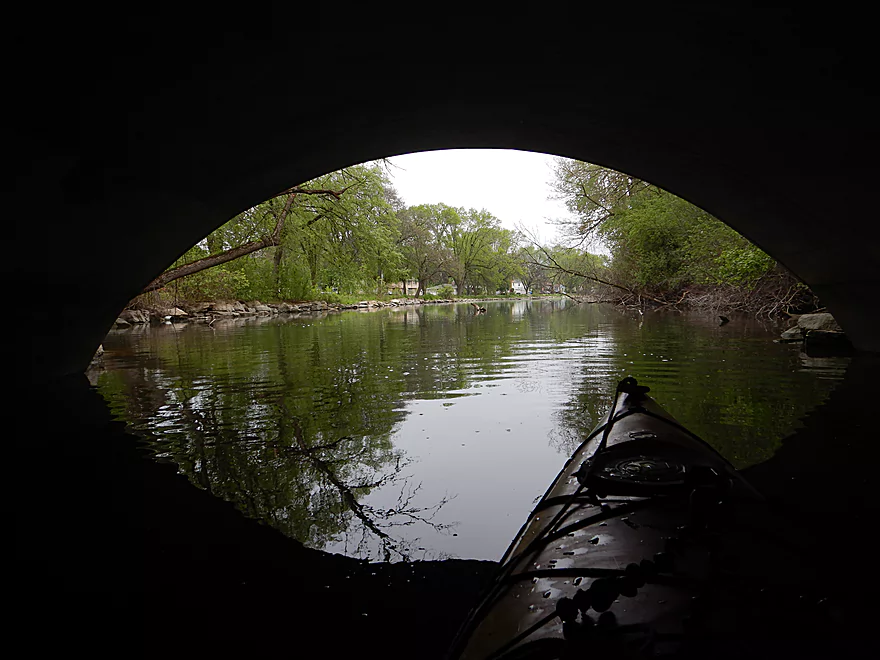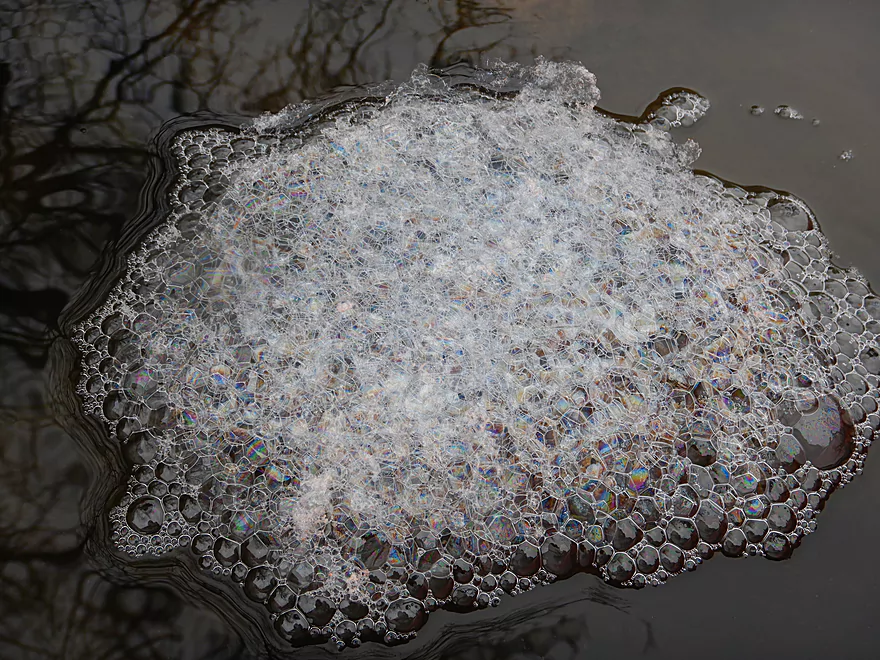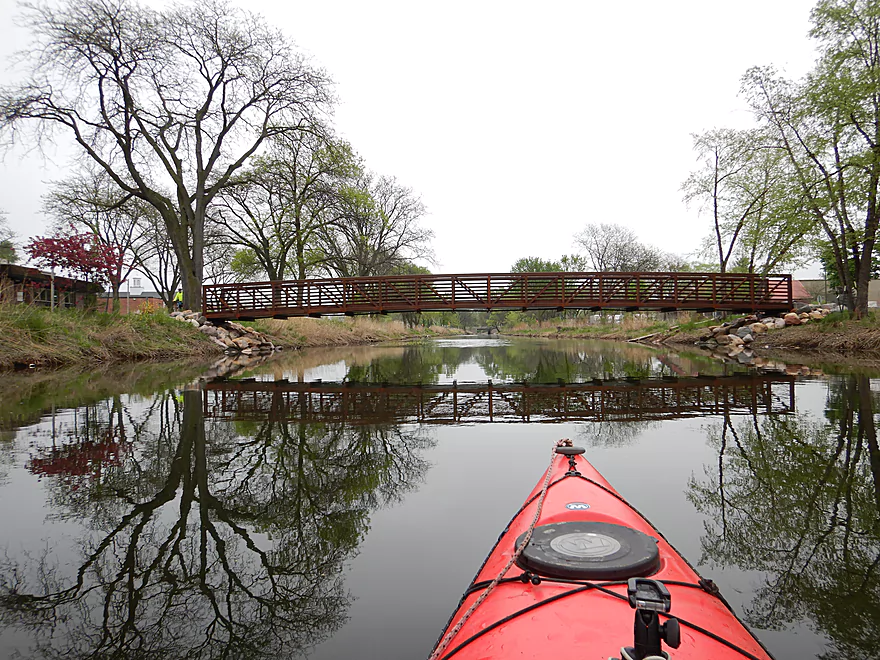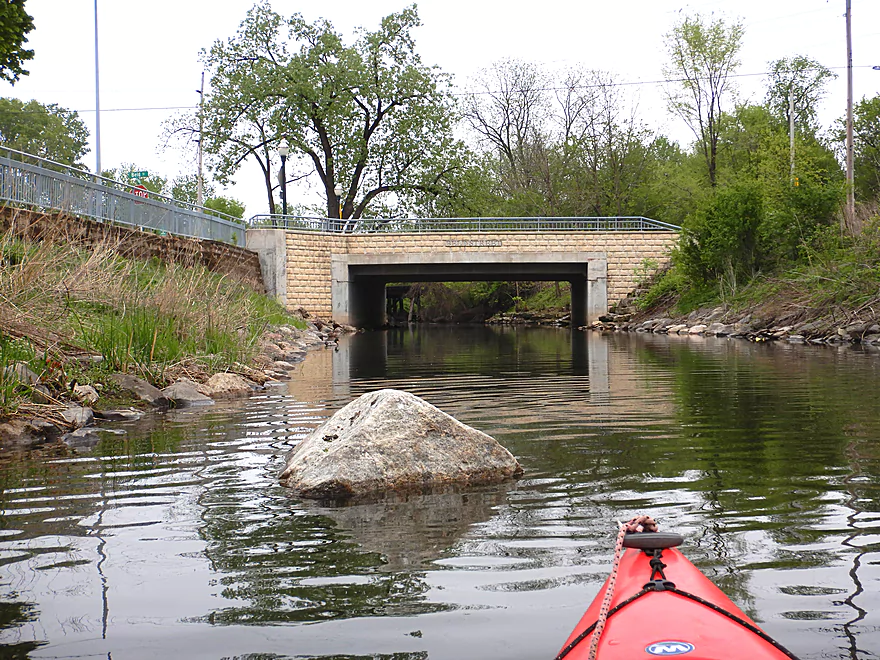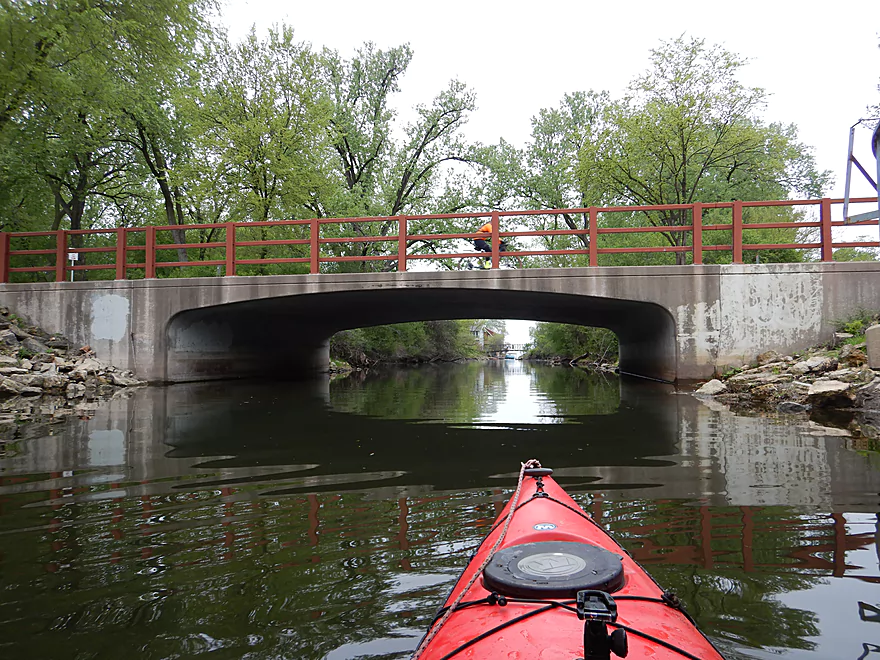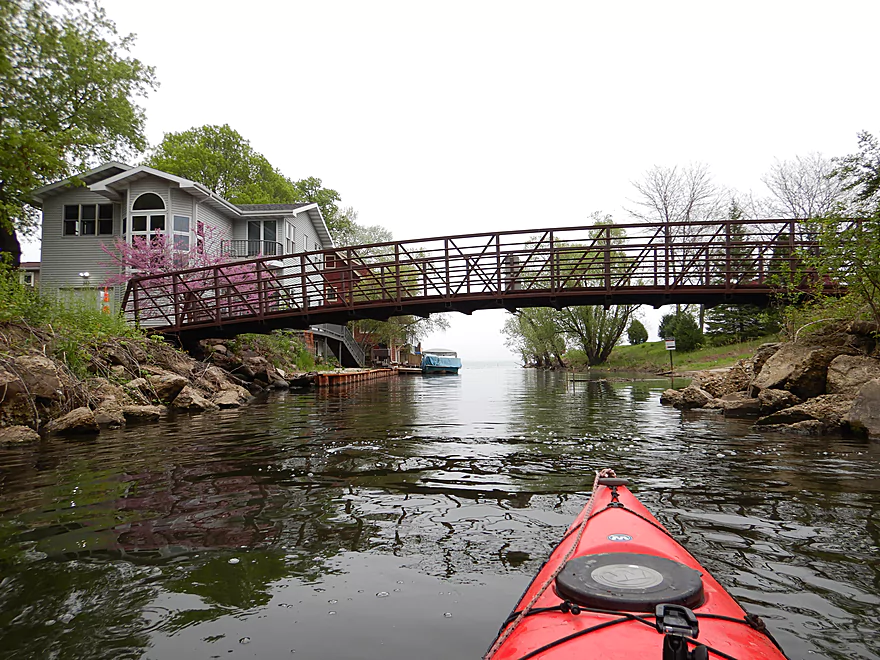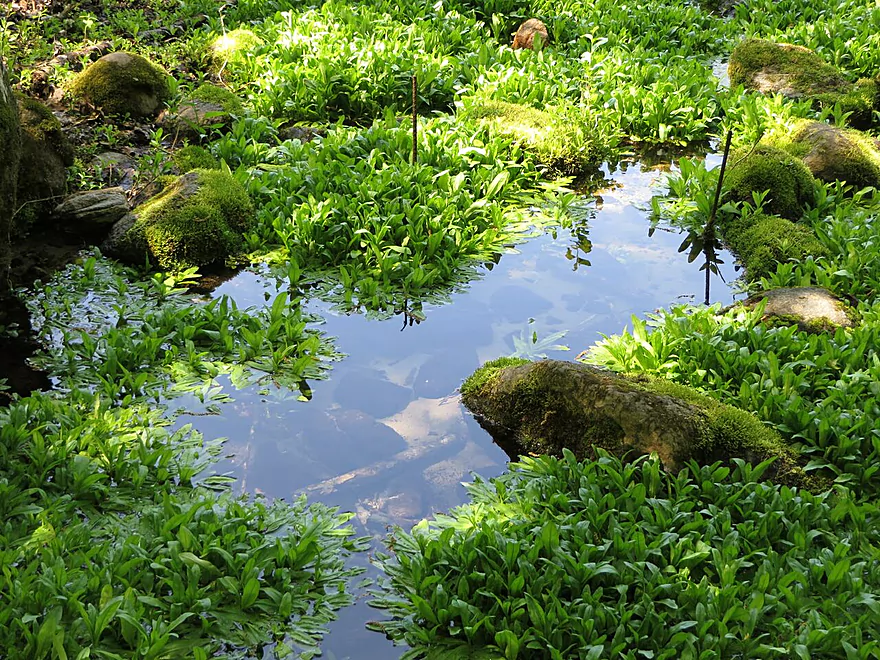Wingra Creek






Wingra Creek is an artificial drainage ditch connecting Lake Wingra to Lake Monona. Before settlement, a large ridge of sand and gravel separated Lake Wingra from Lake Monona, but was removed for construction material and dredged to allow boat access and drainage between the lakes. While not a premier water trail, it is popular with locals.
I started the trip at Vilas Park, which is located along the north shore of Lake Wingra. Despite being close to the heart of metro Madison, this lake is largely undeveloped with several public parks along the north shore and the Arboretum to the south. The lake itself is fed by a number of natural springs, the largest of which is Big Spring, located in the southwest corner (here is a map of all the springs). This is a popular lake with paddlers and fishermen, but does suffer from muck and algae issues. I suspect the four golf courses in its watershed and the downstream dam are mostly to blame. For an interesting overview of the Lake, I highly recommend checking out this online brochure.
As I paddled east past the zoo and beach, I reached the main dam, which was a fairly straightforward portage. The dam itself forms an artsy arc and is extremely popular with fishermen. During high water levels, Lake Monona will backfill Wingra Creek and submerge the dam completely, negating the need for a portage.
Past the dam, the creek starts. It’s not honestly too exciting, as it is mostly slow and straight. Along the left bank, noisy traffic zoomed along Wingra drive, in stark contrast to peaceful Garner Marsh along the west bank, a large undeveloped cattail marsh known for its waterfowl. Supposedly paddlers aren’t allowed onto the marsh, but I don’t think you could enter even if you wanted to as cattails have clogged things up (they do tend to do that).
Once past Fish Hatchery Road, the marsh receded and was replaced with a commercial district. Mysterious bubbles would occasionally float over and sometimes onto the creek. It turns out the culprit was the “Bubble Run“…a massive event that features a race with lots of soap bubbles. It sounds strange because it is…
There were a number of bridges that cross the creek, but unlike nearby Starkweather Creek few were interesting. The one exception was a fantastic stone arch railroad bridge which was the most photogenic part of the trip.
Honestly the trip was pretty uneventful and I actually didn’t mind when it started raining. In fact as long as you don’t have wind or lightning, rain can actually be a neat effect when kayaking. As the drops hit the water, they create cool ripples and pleasing pinging sounds. It also helps with photography as the rain reduces dynamic range.
This wasn’t a very long trip and soon came to an end at Olin Park just past John Nolen Drive. I did sneak out onto Lake Monona where there is a nice view of the Capitol and Monona Terrace, as well as a funky houseboat parked at the mouth.
In summary, this is mostly a trip for locals although it can be novel to paddle from one Madison lake to another. Lake Wingra itself can be a highlight because of its springs and can be scenic at dawn and dusk. For those living out-of-town, I can’t suggest it as a destination paddle. It just was in poor ecological health and lacked variety. Car traffic adjacent to the creek was heavy and I could often smell car exhaust. I also constantly heard some sort of artificial noise…be it autos, a nearby concert from the Coliseum, or the bubble lady on her megaphone urging on runners.
Sights included a rabbit, some ducks, several geese (I always see geese), a beaver (dead and floating face down like a murder victim), some seagulls, and many carp bubbles. The highlight of this creek are the spawning muskies. I didn’t see any on this trip, but there is a fantastic video on Youtube of muskies jumping over the Wingra Dam. The muskie run is famous with locals and usually starts early April and lasts for a few weeks.
UW Arboretum: Located in the heart of West Madison, the Arboretum is a large tract of woods, marsh and prairie set aside for conservation. The property is open to the public and accessible via an excellent series of trails. Part of the trail network extends up to Lake Wingra, and consists of an attractive marsh hike over occasional boardwalks. The highlights here are thick colonies of skunk cabbage and occasional springs. The largest and most prominent of which is Big Spring which directly feeds Lake Wingra. At one time about three dozen springs fed the lake, although many have since been lost or dried up.
Henry Vilas Zoo: This is the main zoo in Madison and is located just north of Lake Wingra. It is somewhat unique among zoos in that it does not charge admission.
I started the trip at Vilas Park which has a number of launch options for paddlers along the shoreline of Lake Wingra. Perhaps the best options are either the main beach or the small canoe landing located at the east end of the park. An outhouse is located conveniently northwest of the canoe pier. Be mindful that parking is limited to three hours and only available for park and zoo patrons. Also note, the nearby parking lots are not large and can fill up. If this happens you could use one of the larger western parking lots, which aren’t as convenient for launching but should be ok.
An alternate put-in would be at Wingra Park, located at the far west end of the lake. This would mean a longer trip and more lake paddling, but if you want to checkout the springs it would be more convenient.
I took out at Olin Park, located at the mouth of Wingra Creek on Lake Monona. This is a busy boat ramp and does require a permit ($8 for one day). The canoe/kayak ramp is located just south of the main boat ramp. I suspect during busy times the parking lot can fill up. Special events may also restrict access to this launch.
There are many other take-out options on Lake Monona to choose from (see my Overview Map). The closest might be Brittingham Park or Esther Beach Park. Because this is a short trip it might not be a bad idea to extend a Wingra Creek trip onto Lake Monona.
I’m not aware of any commercial liveries, but this being Madison, Uber/Lyft/taxis are all shuttle options.
Ideally though you would choose the bike shuttle. The Wingra Creek Bike Path parallels the creek and is a fantastic 2.4 mile shuttle route. It’s flat, direct, well paved, scenic, and rarely crosses traffic because of several well placed bike underpasses. It even has a divided bike lane and mirrors on sharp corners to warn you of other bikers…not something I’m used to! The only downside on my trip was that part of it was shut down to accommodate a herd of bubble runners.
If you are interested in a boat rental on Lake Wingra (no shuttle), you can checkout Wingra Boats located off Knickerbocker Street.
Madison has a unique program where they allow paddlers to leave kayaks at a handful of parks, including Vilas and Olin Parks. For details on rules, fees and locations, click here. This is a great option for those who don’t have a place to store their boats (like many apartment dwellers).
A pretty uneventful creek. No hazards, no logjams and very little current.
I’m not sure this matters much, as the creek is likely navigble at any depth. There is a gauge on Lake Monona which isn’t the greatest analogue but it should be close enough.
- 4.5-5.5′: Below average levels. Fine for paddling. In late summer, weeds in Lake Wingra may become troublesome and unsightly at these levels.
- 5.6-6.0′: Above average levels. I did the trip 5.83′ which was a fine depth.
- 6.1-7.0′: High levels…somewhere in this range the Wingra dam will be submerged allowing you to paddle directly over it. Accessing the springs along the western end of Lake Wingra may be easier to do during high levels.
- 7.1+: Extremely high levels. Some banks may overflow. Likely still navigable though.










